Examining the Books of Kings and Chronicles-2
Mike Ervin
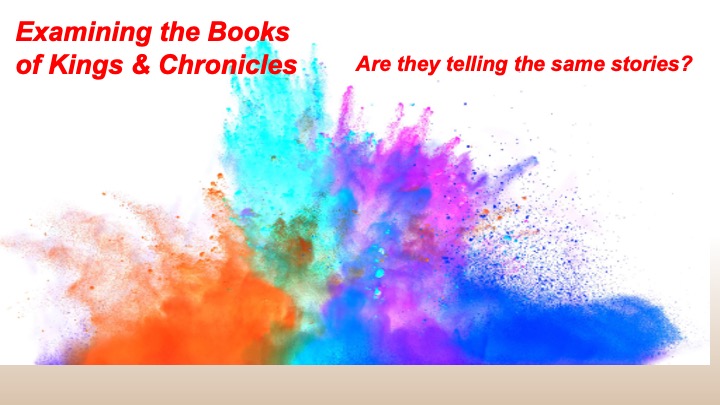
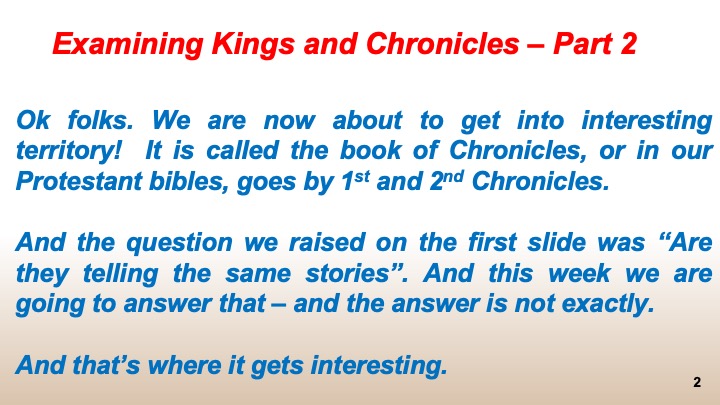
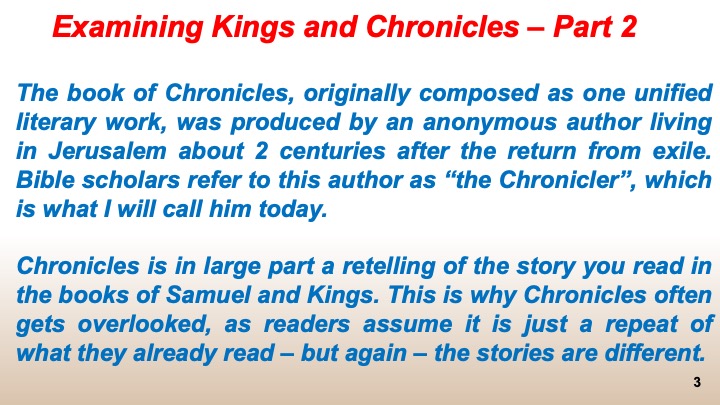
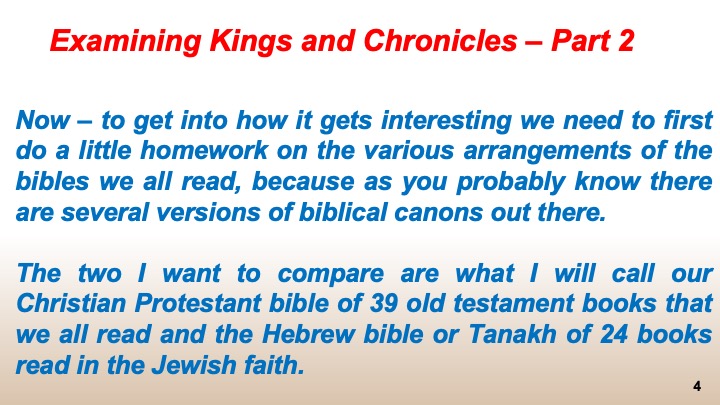
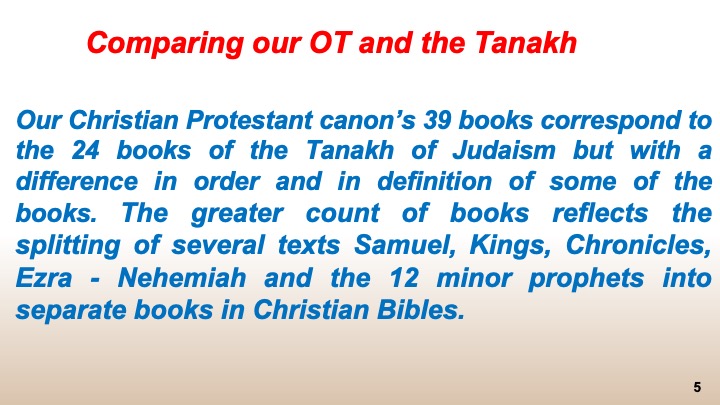
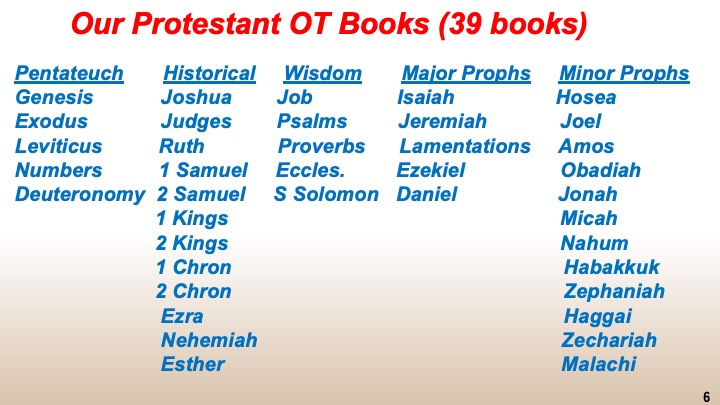
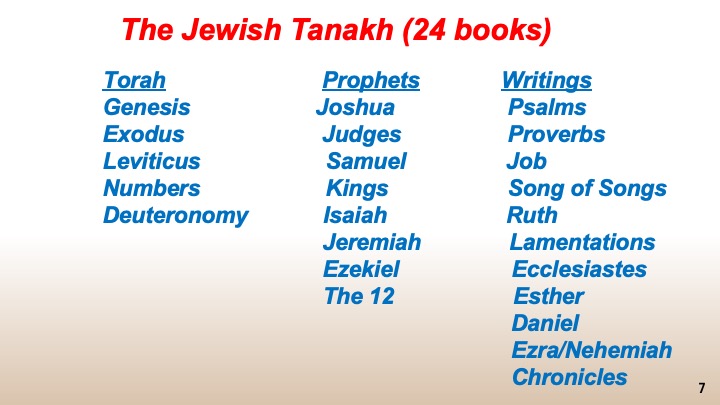
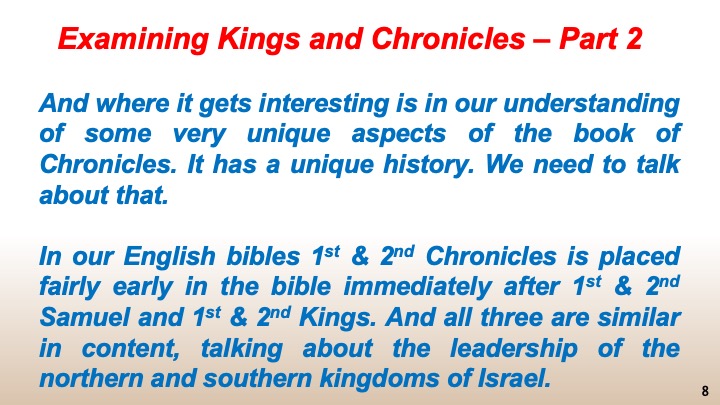
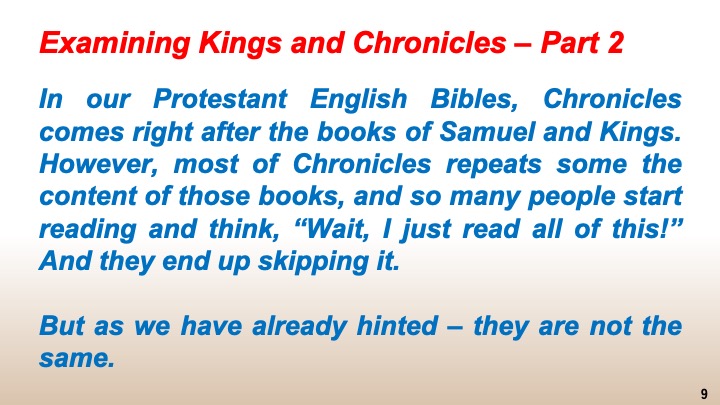
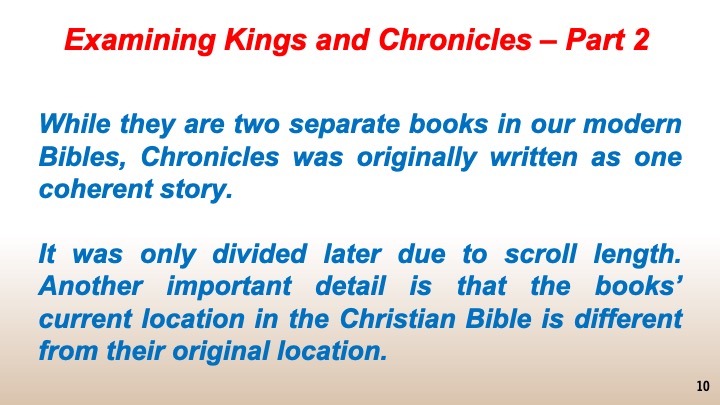
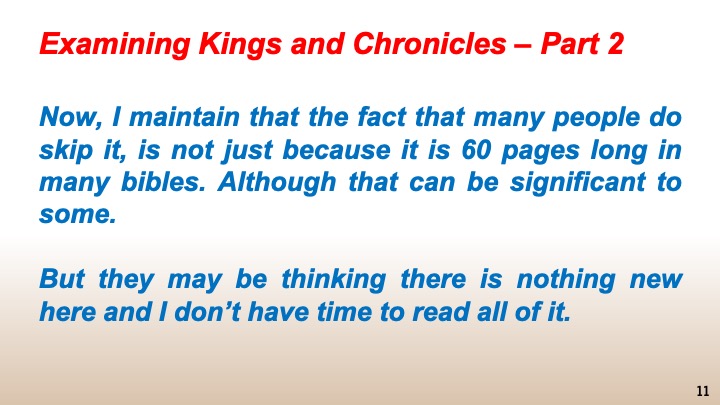
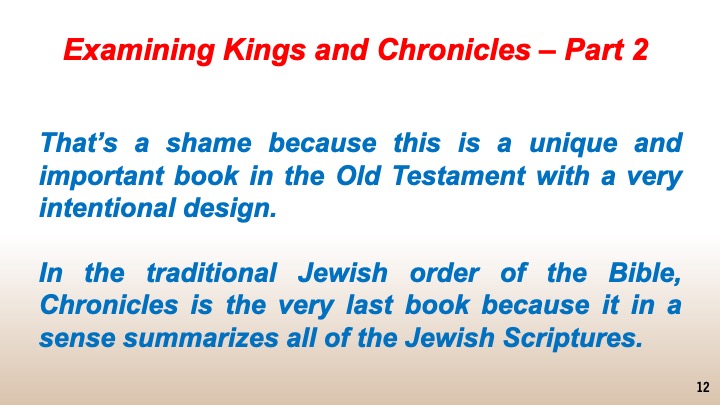
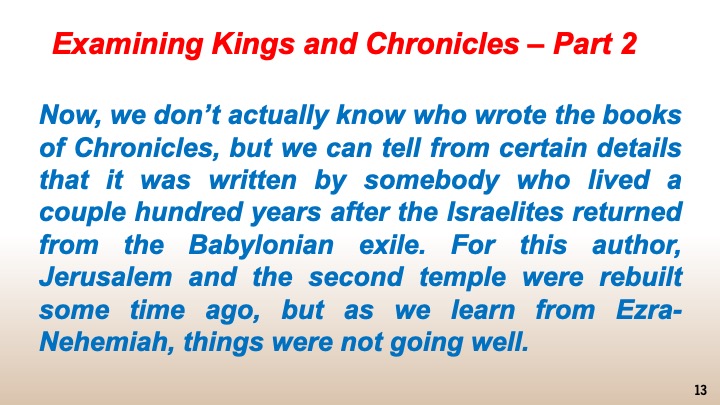
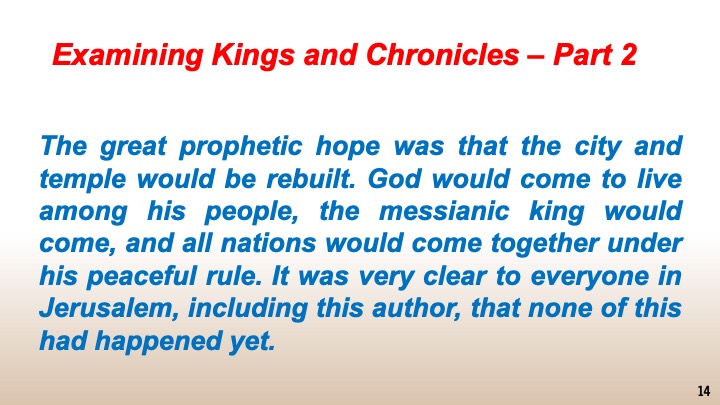
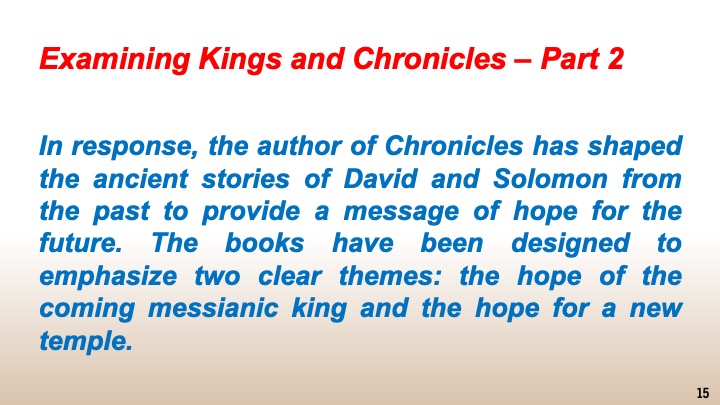
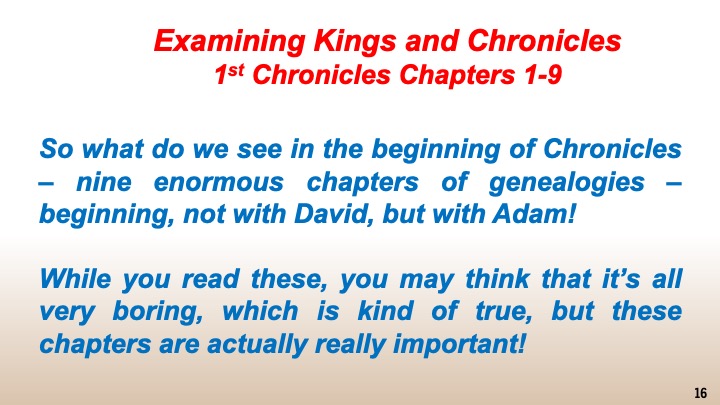
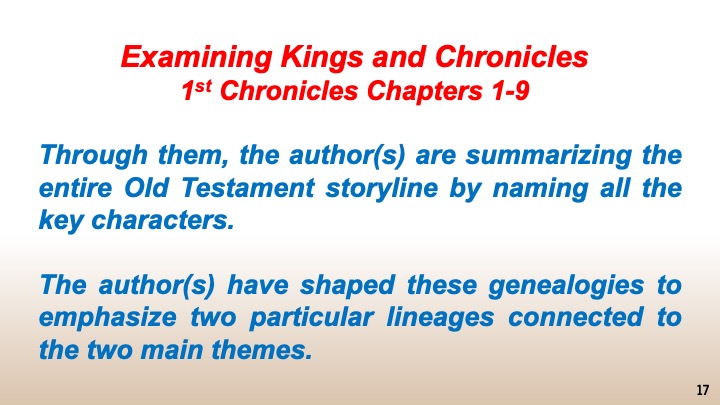
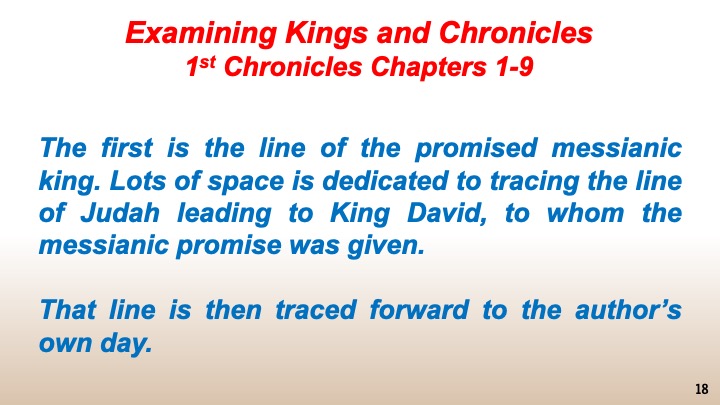
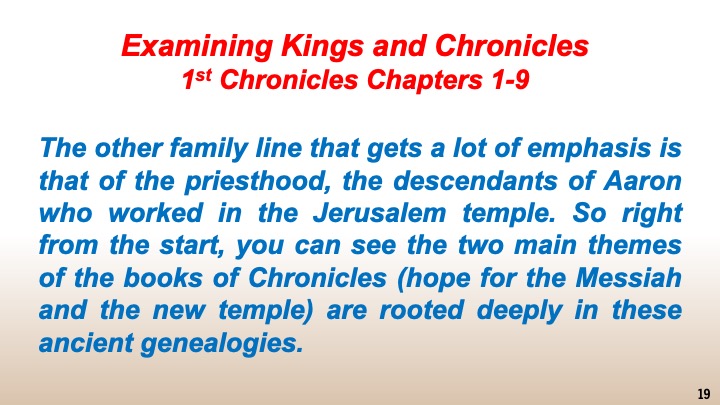
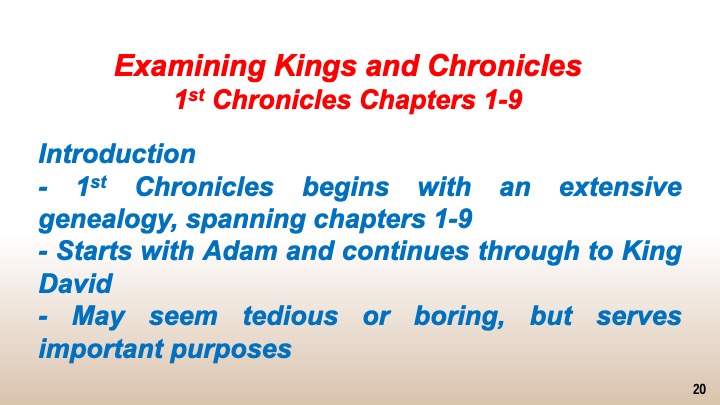
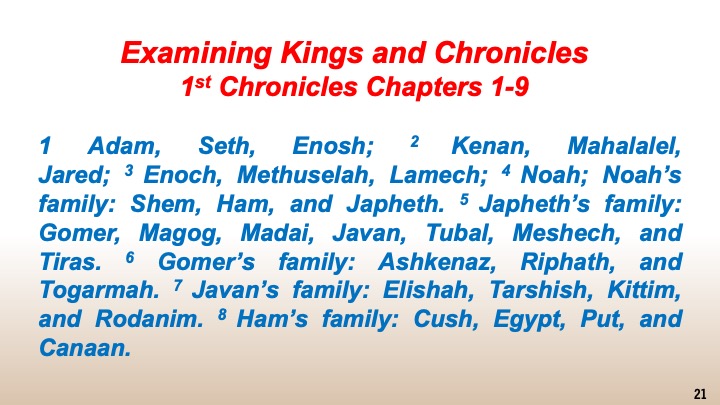
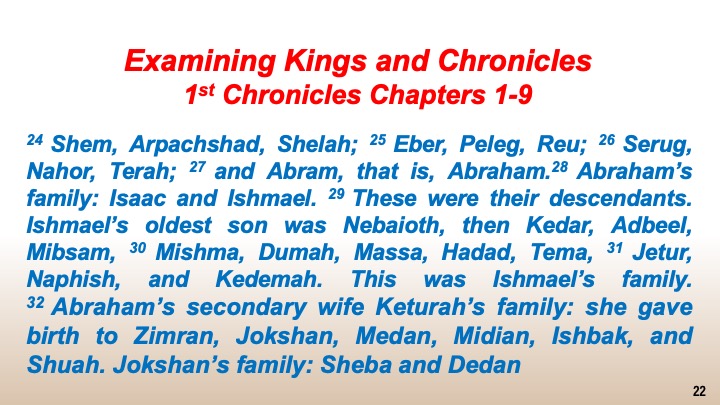
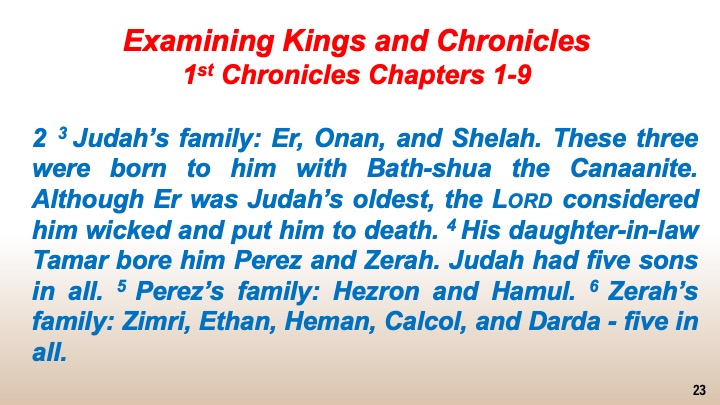
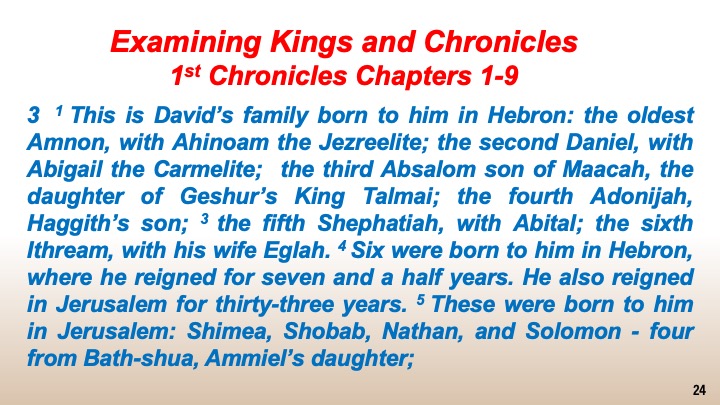
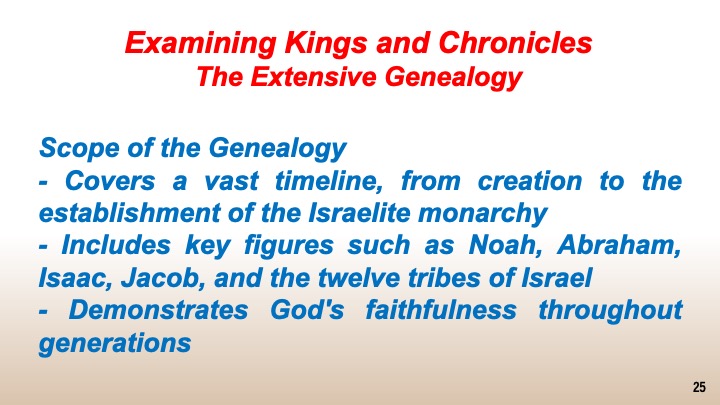
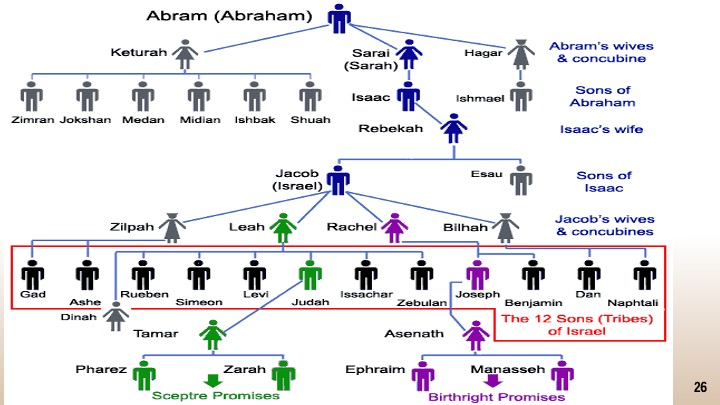
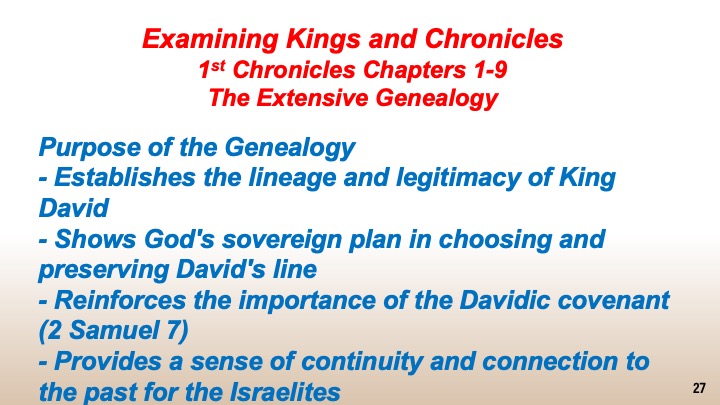
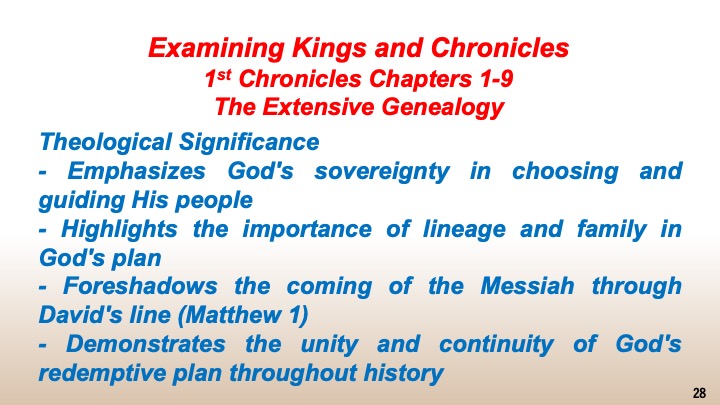
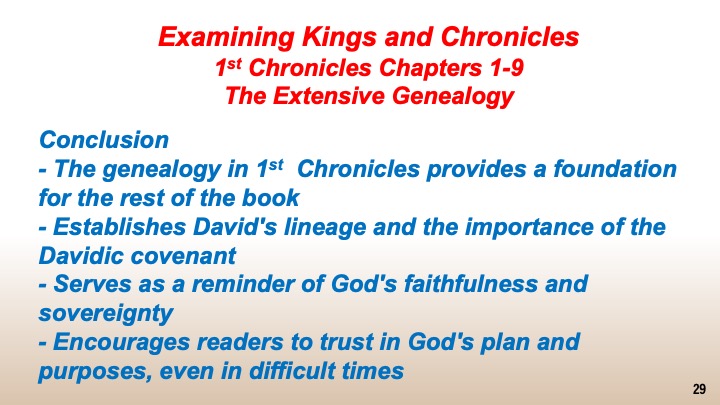
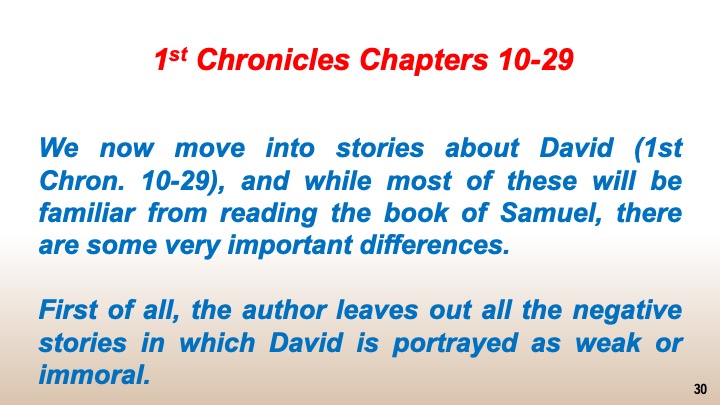
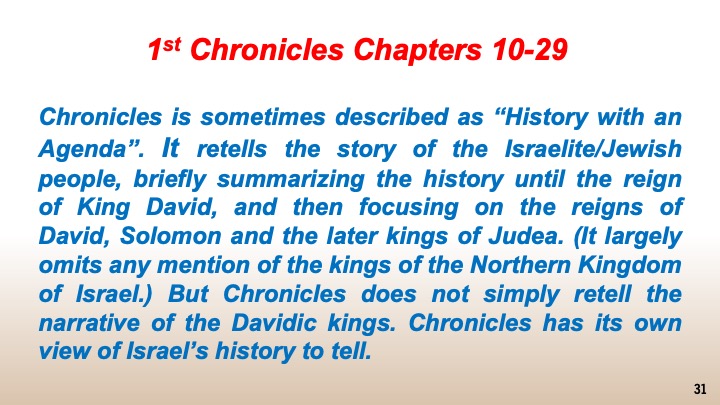
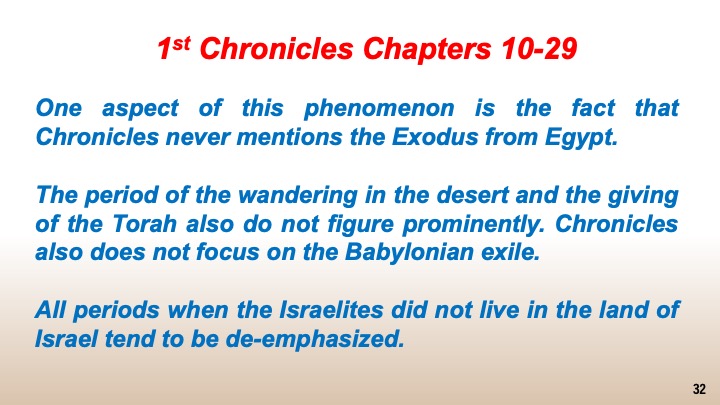
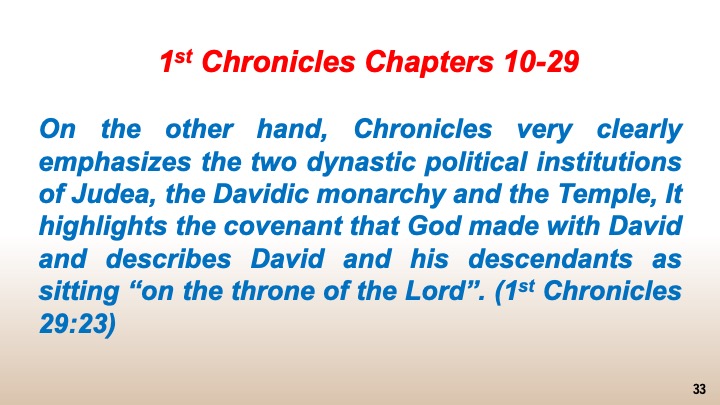
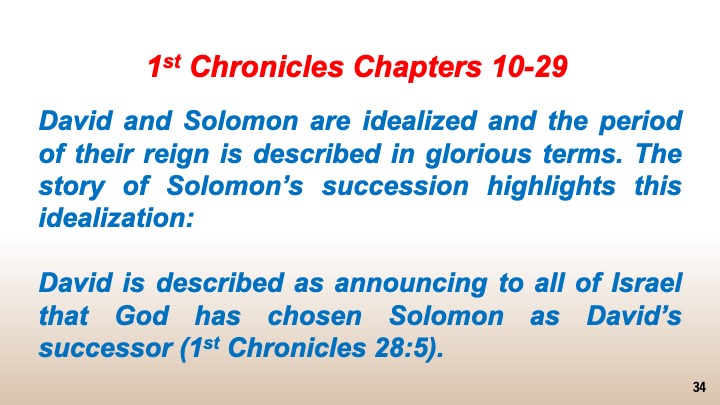
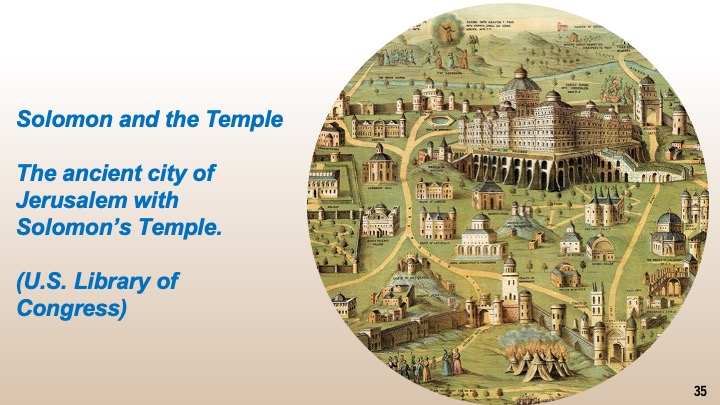
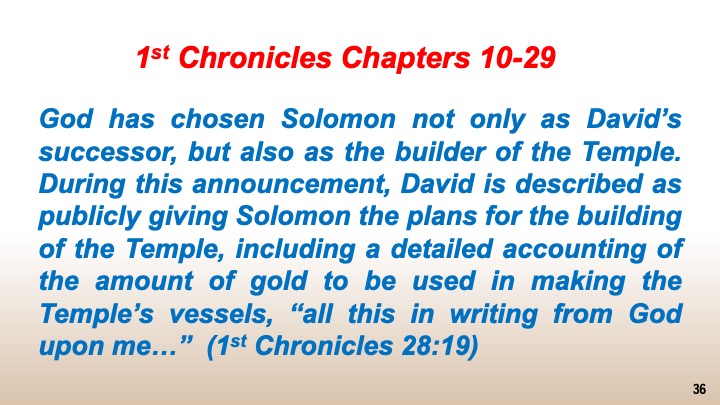
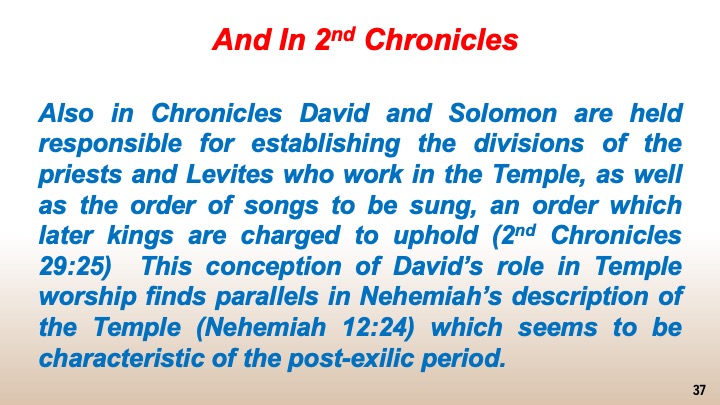
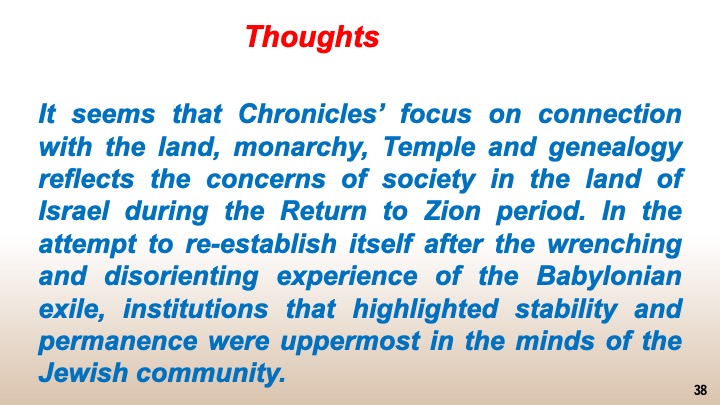
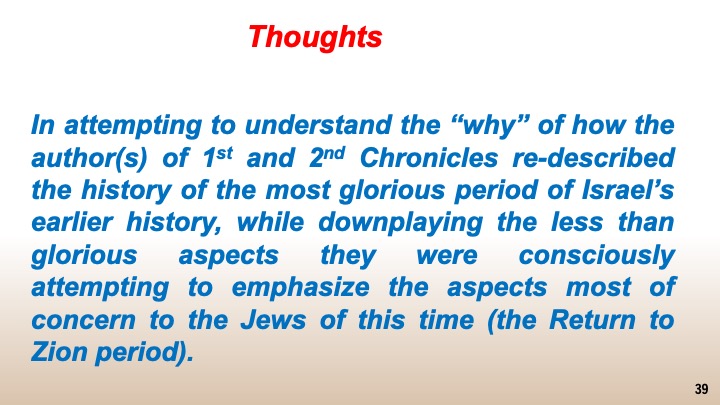
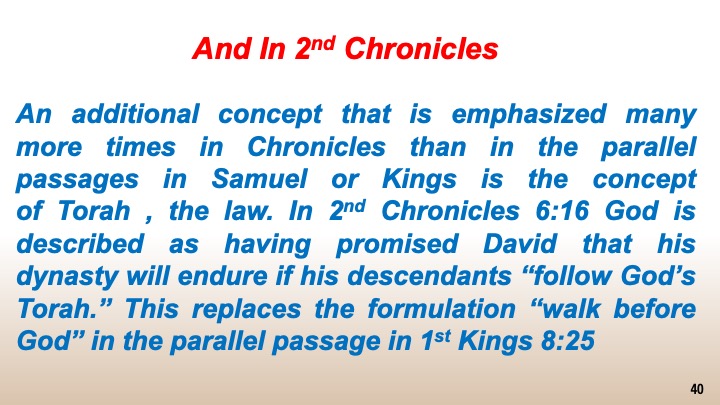
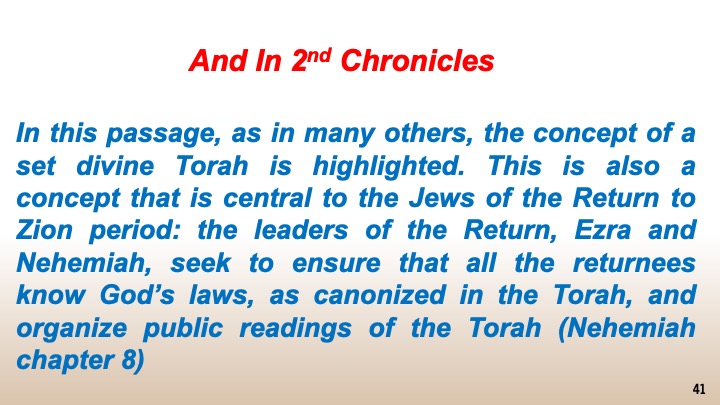
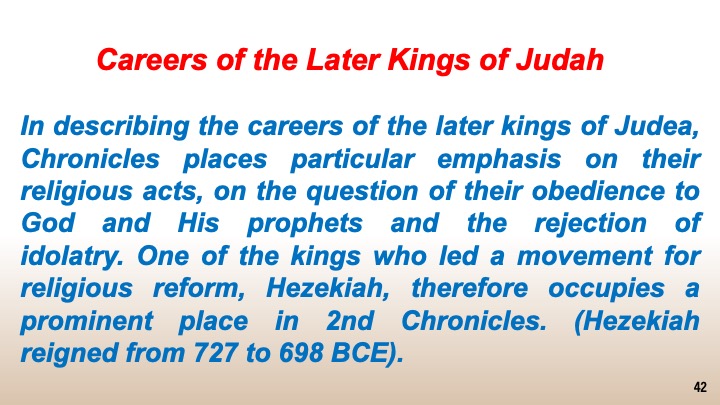
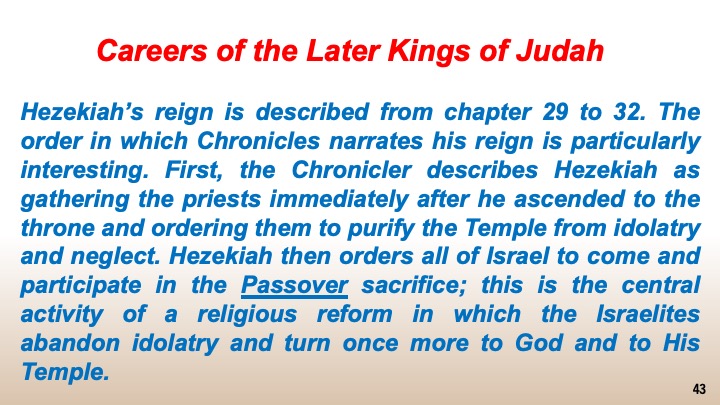
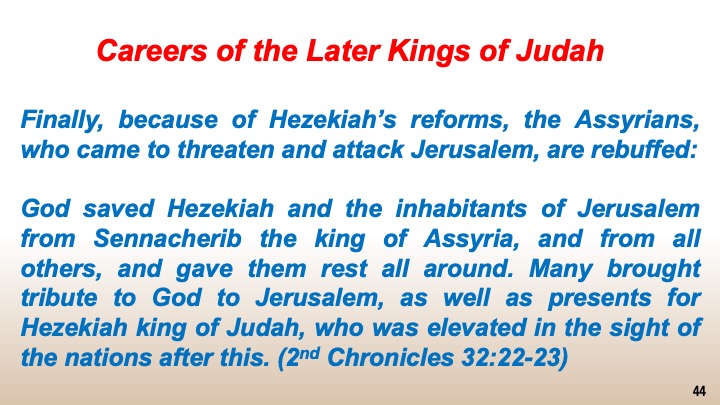
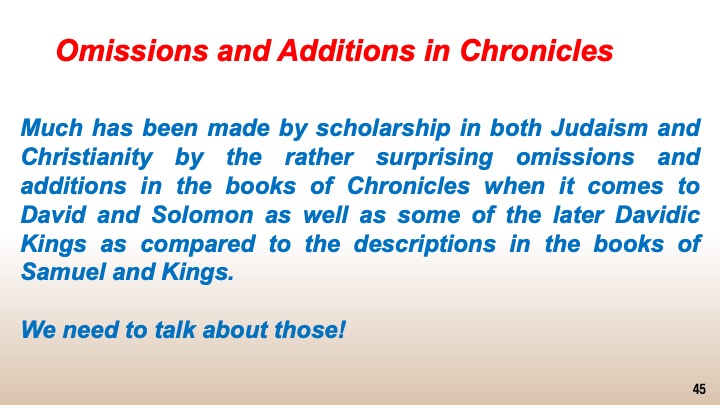
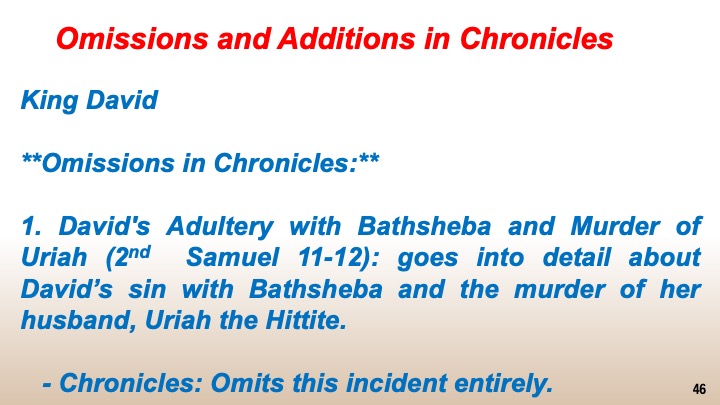
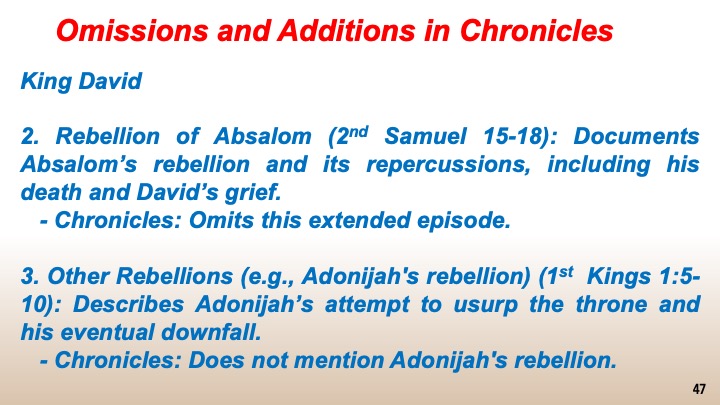
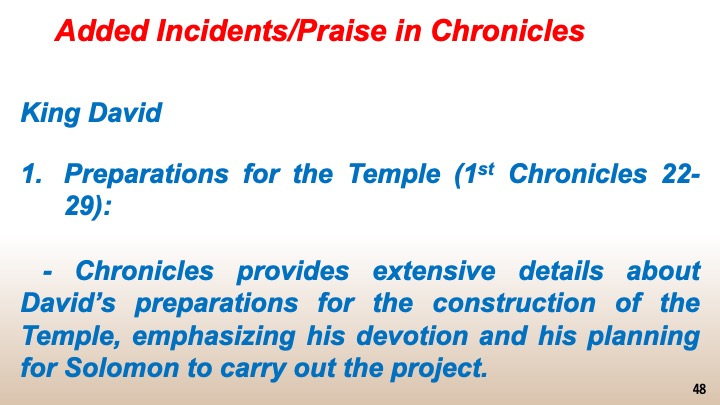
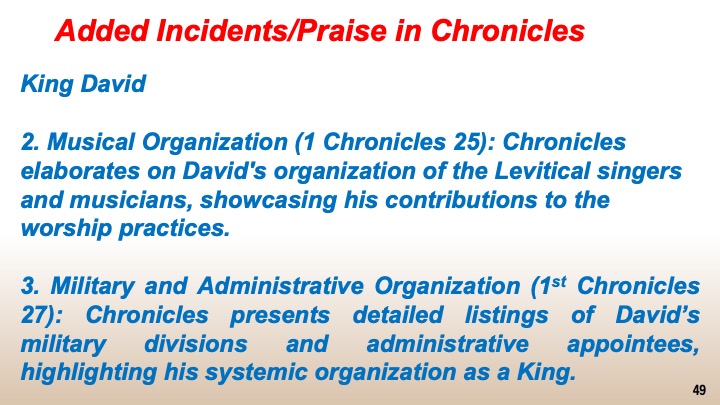
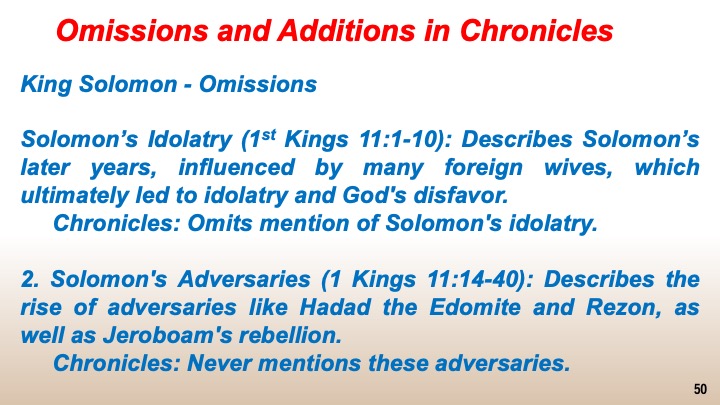
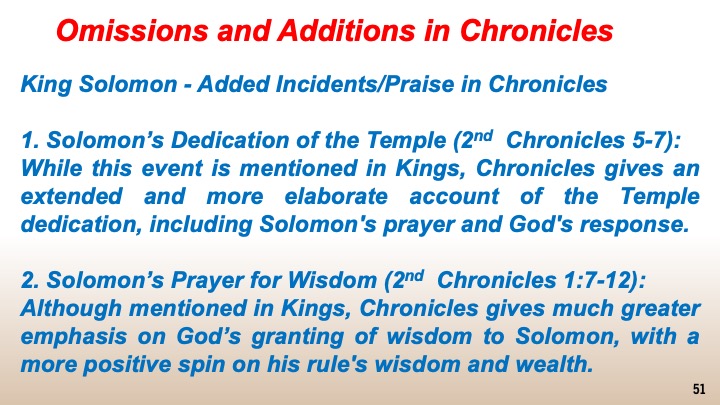
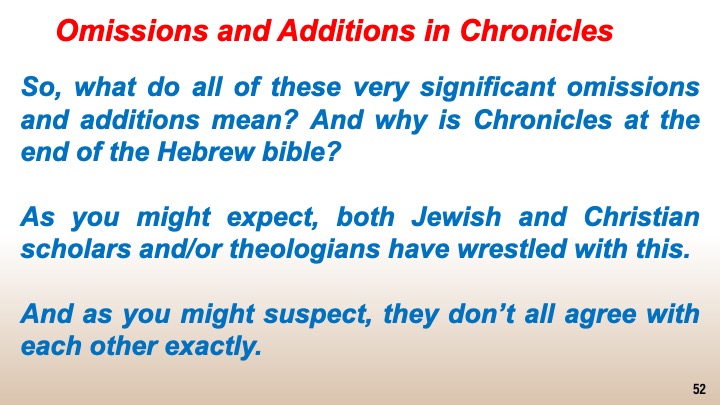
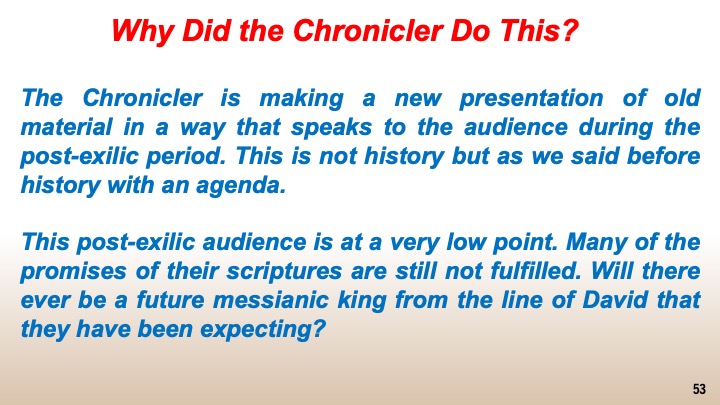
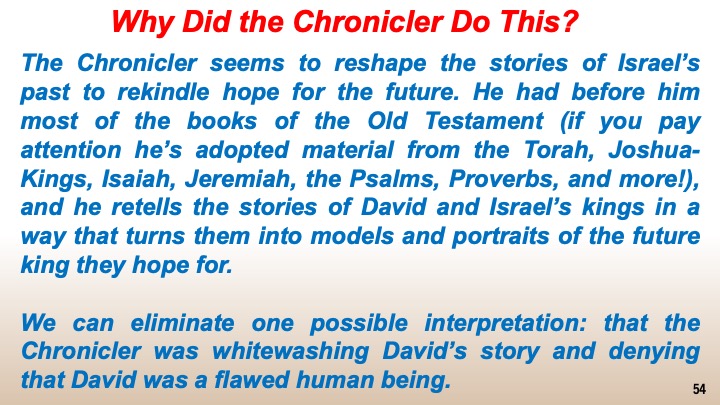
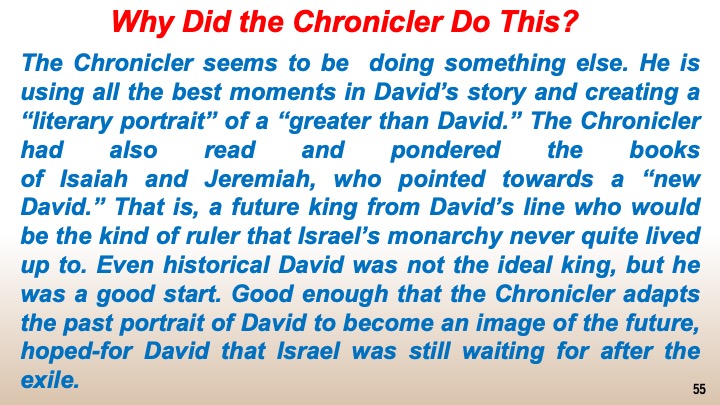
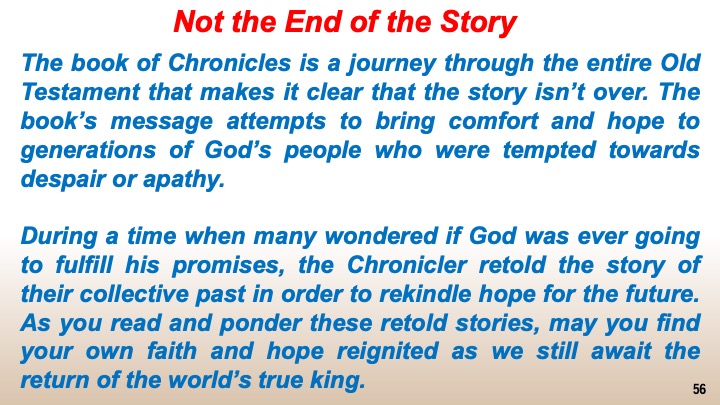
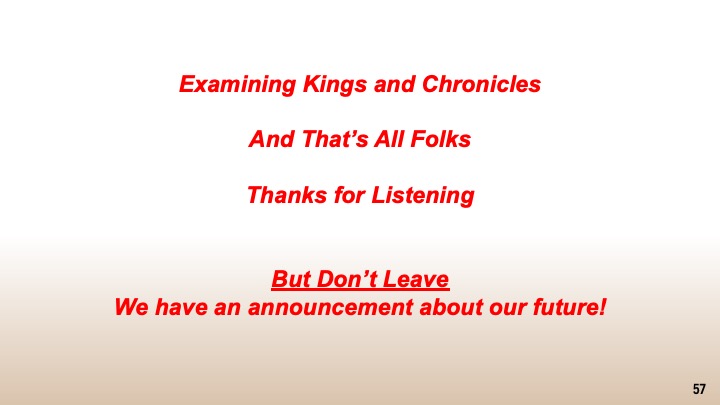
Examining the Books of Kings and Chronicles - Part 2 Text
Examining the Books of Kings and Chronicles – The Text Part 2
Examining the Books of Kings & Chronicles
Ok folks. We are now about to get into interesting territory! It is called the book of Chronicles, or in our Protestant bibles, goes by 1st and 2nd Chronicles.
And the question we raised on the first slide was “Are they telling the same stories”. And this week we are going to answer that – and the answer is not exactly.
And that’s where it gets interesting.
The book of Chronicles, originally composed as one unified literary work, was produced by an anonymous author living in Jerusalem about 2 centuries after the return from exile. Bible scholars refer to this author as “the Chronicler”, which is what I will call him today.
Chronicles is in large part a retelling of the story you read in the books of Samuel and Kings. This is why Chronicles often gets overlooked, as readers assume it is just a repeat of what they already read – but again – the stories are different.
Now – to get into how it gets interesting we need to first do a little homework on the various arrangements of the bibles we all read, because as you probably know there are several versions of biblical canons out there.
The two I want to compare are what I will call our Christian Protestant bible of 39 old testament books that we all read and the Hebrew bible or Tanakh of 24 books read in the Jewish faith.
Our Christian Protestant canon’s 39 books correspond to the 24 books of the Tanakh of Judaism but with a difference in order and in definition of some of the books. The greater count of books reflects the splitting of several texts Samuel, Kings, Chronicles, Ezra - Nehemiah and the 12 minor prophets into separate books in Christian Bibles.
Our Protestant OT Books (39 books)
Pentateuch Historical Wisdom Major Prophs Minor Prophs
Genesis Joshua Job Isaiah Hosea
Exodus Judges Psalms Jeremiah Joel
Leviticus Ruth Proverbs Lamentations Amos
Numbers 1 Samuel Eccles. Ezekiel Obadiah
Deuteronomy 2 Samuel S Solomon Daniel Jonah
1 Kings Micah
2 Kings Nahum
1 Chron Habakkuk
2 Chron Zephaniah
Ezra Haggai
Nehemiah Zechariah
Esther Malachi
The Jewish Tanakh (24 books)
Torah Prophets Writings
Genesis Joshua Psalms
Exodus Judges Proverbs
Leviticus Samuel Job
Numbers Kings Song of Songs
Deuteronomy Isaiah Ruth
Jeremiah Lamentations
Ezekiel Ecclesiastes
The 12 Esther
Daniel
Ezra/Nehemiah
Chronicles
And where it gets interesting is in our understanding of some very unique aspects of the book of Chronicles. It has a unique history. We need to talk about that.
In our English bibles 1st & 2nd Chronicles is placed fairly early in the bible immediately after 1st & 2nd Samuel and 1st & 2nd Kings. And all three are similar in content, talking about the leadership of the northern and southern kingdoms of Israel.
In our Protestant English Bibles, Chronicles comes right after the books of Samuel and Kings. However, most of Chronicles repeats some the content of those books, and so many people start reading and think, “Wait, I just read all of this!” And they end up skipping it.
But as we have already hinted – they are not the same.
While they are two separate books in our modern Bibles, Chronicles was originally written as one coherent story.
It was only divided later due to scroll length. Another important detail is that the books’ current location in the Christian Bible is different from their original location.
Now, I maintain that the fact that many people do skip it, is not just because it is 60 pages long in many bibles. Although that can be significant to some.
But they may be thinking there is nothing new here and I don’t have time to read all of it.
That’s a shame because this is a unique and important book in the Old Testament with a very intentional design.
In the traditional Jewish order of the Bible, Chronicles is the very last book because it in a sense summarizes all of the Jewish Scriptures.
Now, we don’t actually know who wrote the books of Chronicles, but we can tell from certain details that it was written by somebody who lived a couple hundred years after the Israelites returned from the Babylonian exile. For this author, Jerusalem and the second temple were rebuilt some time ago, but as we learn from Ezra-Nehemiah, things were not going well.
The great prophetic hope was that the city and temple would be rebuilt. God would come to live among his people, the messianic king would come, and all nations would come together under his peaceful rule. It was very clear to everyone in Jerusalem, including this author, that none of this had happened yet.
In response, the author of Chronicles has shaped the ancient stories of David and Solomon from the past to provide a message of hope for the future. The books have been designed to emphasize two clear themes: the hope of the coming messianic king and the hope for a new temple.
So what do we see in the beginning of Chronicles – nine enormous chapters of genealogies – beginning, not with David, but with Adam!
While you read these, you may think that it’s all very boring, which is kind of true, but these chapters are actually really important!
Through them, the author(s) are summarizing the entire Old Testament storyline by naming all the key characters.
The author(s) have shaped these genealogies to emphasize two particular lineages connected to the two main themes.
The first is the line of the promised messianic king. Lots of space is dedicated to tracing the line of Judah leading to King David, to whom the messianic promise was given.
That line is then traced forward to the author’s own day.
The other family line that gets a lot of emphasis is that of the priesthood, the descendants of Aaron who worked in the Jerusalem temple. So right from the start, you can see the two main themes of the books of Chronicles (hope for the Messiah and the new temple) are rooted deeply in these ancient genealogies.
Examining Kings and Chronicles 1st Chronicles Chapters 1-9
Introduction
- 1st Chronicles begins with an extensive genealogy, spanning chapters 1-9
- Starts with Adam and continues through to King David
- May seem tedious or boring, but serves important purposes
1st Chronicles Chapters 1-9
1 Adam, Seth, Enosh; 2 Kenan, Mahalalel, Jared; 3 Enoch, Methuselah, Lamech; 4 Noah; Noah’s family: Shem, Ham, and Japheth. 5 Japheth’s family: Gomer, Magog, Madai, Javan, Tubal, Meshech, and Tiras. 6 Gomer’s family: Ashkenaz, Riphath, and Togarmah. 7 Javan’s family: Elishah, Tarshish, Kittim, and Rodanim. 8 Ham’s family: Cush, Egypt, Put, and Canaan.
24 Shem, Arpachshad, Shelah; 25 Eber, Peleg, Reu; 26 Serug, Nahor, Terah; 27 and Abram, that is, Abraham.28 Abraham’s family: Isaac and Ishmael. 29 These were their descendants. Ishmael’s oldest son was Nebaioth, then Kedar, Adbeel, Mibsam, 30 Mishma, Dumah, Massa, Hadad, Tema, 31 Jetur, Naphish, and Kedemah. This was Ishmael’s family. 32 Abraham’s secondary wife Keturah’s family: she gave birth to Zimran, Jokshan, Medan, Midian, Ishbak, and Shuah. Jokshan’s family: Sheba and Dedan
3 1 This is David’s family born to him in Hebron: the oldest Amnon, with Ahinoam the Jezreelite; the second Daniel, with Abigail the Carmelite; the third Absalom son of Maacah, the daughter of Geshur’s King Talmai; the fourth Adonijah, Haggith’s son; 3 the fifth Shephatiah, with Abital; the sixth Ithream, with his wife Eglah. 4 Six were born to him in Hebron, where he reigned for seven and a half years. He also reigned in Jerusalem for thirty-three years. 5 These were born to him in Jerusalem: Shimea, Shobab, Nathan, and Solomon - four from Bath-shua, Ammiel’s daughter;
Examining Kings and
Chronicles
The Extensive Genealogy
Scope of the Genealogy
- Covers a vast timeline, from creation to the establishment of the Israelite monarchy
- Includes key figures such as Noah, Abraham, Isaac, Jacob, and the twelve tribes of Israel
- Demonstrates God's faithfulness throughout generations
Purpose of the Genealogy
- Establishes the lineage and legitimacy of King David
- Shows God's sovereign plan in choosing and preserving David's line
- Reinforces the importance of the Davidic covenant (2 Samuel 7)
- Provides a sense of continuity and connection to the past for the Israelites
Theological Significance
- Emphasizes God's sovereignty in choosing and guiding His people
- Highlights the importance of lineage and family in God's plan
- Foreshadows the coming of the Messiah through David's line (Matthew 1)
- Demonstrates the unity and continuity of God's redemptive plan throughout history
Conclusion
- The genealogy in 1st Chronicles provides a foundation for the rest of the book
- Establishes David's lineage and the importance of the Davidic covenant
- Serves as a reminder of God's faithfulness and sovereignty
- Encourages readers to trust in God's plan and purposes, even in difficult times
1st Chronicles Chapters 10-29
We now move into stories about David (1st Chron. 10-29), and while most of these will be familiar from reading the book of Samuel, there are some very important differences.
First of all, the author leaves out all the negative stories in which David is portrayed as weak or immoral.
Chronicles is sometimes described as “History with an Agenda”. It retells the story of the Israelite/Jewish people, briefly summarizing the history until the reign of King David, and then focusing on the reigns of David, Solomon and the later kings of Judea. (It largely omits any mention of the kings of the Northern Kingdom of Israel.) But Chronicles does not simply retell the narrative of the Davidic kings. Chronicles has its own view of Israel’s history to tell.
One aspect of this phenomenon is the fact that Chronicles never mentions the Exodus from Egypt.
The period of the wandering in the desert and the giving of the Torah also do not figure prominently. Chronicles also does not focus on the Babylonian exile.
All periods when the Israelites did not live in the land of Israel tend to be de-emphasized.
On the other hand, Chronicles very clearly emphasizes the two dynastic political institutions of Judea, the Davidic monarchy and the Temple, It highlights the covenant that God made with David and describes David and his descendants as sitting “on the throne of the Lord”. (1st Chronicles 29:23)
David and Solomon are idealized and the period of their reign is described in glorious terms. The story of Solomon’s succession highlights this idealization:
David is described as announcing to all of Israel that God has chosen Solomon as David’s successor (1st Chronicles 28:5).
God has chosen Solomon not only as David’s successor, but also as the builder of the Temple. During this announcement, David is described as publicly giving Solomon the plans for the building of the Temple, including a detailed accounting of the amount of gold to be used in making the Temple’s vessels, “all this in writing from God upon me…” (1st Chronicles 28:19)
And In 2nd Chronicles
Also in Chronicles David and Solomon are held responsible for establishing the divisions of the priests and Levites who work in the Temple, as well as the order of songs to be sung, an order which later kings are charged to uphold (2nd Chronicles 29:25) This conception of David’s role in Temple worship finds parallels in Nehemiah’s description of the Temple (Nehemiah 12:24) which seems to be characteristic of the post-exilic period.
Thoughts
It seems that Chronicles’ focus on connection with the land, monarchy, Temple and genealogy reflects the concerns of society in the land of Israel during the Return to Zion period. In the attempt to re-establish itself after the wrenching and disorienting experience of the Babylonian exile, institutions that highlighted stability and permanence were uppermost in the minds of the Jewish community.
In attempting to understand the “why” of how the author(s) of 1st and 2nd Chronicles re-described the history of the most glorious period of Israel’s earlier history, while downplaying the less than glorious aspects they were consciously attempting to emphasize the aspects most of concern to the Jews of this time (the Return to Zion period).
An additional concept that is emphasized many more times in Chronicles than in the parallel passages in Samuel or Kings is the concept of Torah , the law. In 2nd Chronicles 6:16 God is described as having promised David that his dynasty will endure if his descendants “follow God’s Torah.” This replaces the formulation “walk before God” in the parallel passage in 1st Kings 8:25
In this passage, as in many others, the concept of a set divine Torah is highlighted. This is also a concept that is central to the Jews of the Return to Zion period: the leaders of the Return, Ezra and Nehemiah, seek to ensure that all the returnees know God’s laws, as canonized in the Torah, and organize public readings of the Torah (Nehemiah chapter 8)
Careers of the Later Kings of Judah
In describing the careers of the later kings of Judea, Chronicles places particular emphasis on their religious acts, on the question of their obedience to God and His prophets and the rejection of idolatry. One of the kings who led a movement for religious reform, Hezekiah, therefore occupies a prominent place in 2nd Chronicles. (Hezekiah reigned from 727 to 698 BCE).
Hezekiah’s reign is described from chapter 29 to 32. The order in which Chronicles narrates his reign is particularly interesting. First, the Chronicler describes Hezekiah as gathering the priests immediately after he ascended to the throne and ordering them to purify the Temple from idolatry and neglect. Hezekiah then orders all of Israel to come and participate in the Passover sacrifice; this is the central activity of a religious reform in which the Israelites abandon idolatry and turn once more to God and to His Temple.
Finally, because of Hezekiah’s reforms, the Assyrians, who came to threaten and attack Jerusalem, are rebuffed:
God saved Hezekiah and the inhabitants of Jerusalem from Sennacherib the king of Assyria, and from all others, and gave them rest all around. Many brought tribute to God to Jerusalem, as well as presents for Hezekiah king of Judah, who was elevated in the sight of the nations after this. (2nd Chronicles 32:22-23)
Omissions and Additions in Chronicles
Much has been made by scholarship in both Judaism and Christianity by the rather surprising omissions and additions in the books of Chronicles when it comes to David and Solomon as well as some of the later Davidic Kings as compared to the descriptions in the books of Samuel and Kings.
We need to talk about those!
King David Omissions in Chronicles:
1. David's Adultery with Bathsheba and Murder of Uriah (2nd Samuel 11-12): goes into detail about David’s sin with Bathsheba and the murder of her husband, Uriah the Hittite.
- Chronicles: Omits this incident entirely.
2. Rebellion of Absalom (2nd Samuel 15-18): Documents Absalom’s rebellion and its repercussions, including his death and David’s grief.
- Chronicles: Omits this extended episode.
3. Other Rebellions (e.g., Adonijah's rebellion) (1st Kings 1:5-10): Describes Adonijah’s attempt to usurp the throne and his eventual downfall.
- Chronicles: Does not mention Adonijah's rebellion.
Added Incidents/Praise in Chronicles
King David
- Preparations for the Temple (1st Chronicles 22-29): Chronicles provides extensive details about David’s preparations for the construction of the Temple, emphasizing his devotion and his planning for Solomon to carry out the project.
2. Musical Organization (1 Chronicles 25): Chronicles elaborates on David's organization of the Levitical singers and musicians, showcasing his contributions to the worship practices.
3. Military and Administrative Organization (1st Chronicles 27): Chronicles presents detailed listings of David’s military divisions and administrative appointees, highlighting his systemic organization as a King
King Solomon - Omissions
Solomon’s Idolatry (1st Kings 11:1-10): Describes Solomon’s later years, influenced by many foreign wives, which ultimately led to idolatry and God's disfavor.
Chronicles: Omits mention of Solomon's idolatry.
2. Solomon's Adversaries (1 Kings 11:14-40): Describes the rise of adversaries like Hadad the Edomite and Rezon, as well as Jeroboam's rebellion.
Chronicles: Never mentions these adversaries.
King Solomon - Added Incidents/Praise in Chronicles
1. Solomon’s Dedication of the Temple (2nd Chronicles 5-7):
While this event is mentioned in Kings, Chronicles gives an extended and more elaborate account of the Temple dedication, including Solomon's prayer and God's response.
2. Solomon’s Prayer for Wisdom (2nd Chronicles 1:7-12):
Although mentioned in Kings, Chronicles gives much greater emphasis on God’s granting of wisdom to Solomon, with a more positive spin on his rule's wisdom and wealth.
Omissions and Additions in Chronicles
So, what do all of these very significant omissions and additions mean? And why is Chronicles at the end of the Hebrew bible?
As you might expect, both Jewish and Christian scholars and/or theologians have wrestled with this.
And as you might suspect, they don’t all agree with each other exactly.
Why Did the Chronicler Do This?
The Chronicler is making a new presentation of old material in a way that speaks to the audience during the post-exilic period. This is not history but as we said before history with an agenda.
This post-exilic audience is at a very low point. Many of the promises of their scriptures are still not fulfilled. Will there ever be a future messianic king from the line of David that they have been expecting?
The Chronicler seems to reshape the stories of Israel’s past to rekindle hope for the future. He had before him most of the books of the Old Testament (if you pay attention he’s adopted material from the Torah, Joshua-Kings, Isaiah, Jeremiah, the Psalms, Proverbs, and more!), and he retells the stories of David and Israel’s kings in a way that turns them into models and portraits of the future king they hope for.
We can eliminate one possible interpretation: that the Chronicler was whitewashing David’s story and denying that David was a flawed human being.
The Chronicler seems to be doing something else. He is using all the best moments in David’s story and creating a “literary portrait” of a “greater than David.” The Chronicler had also read and pondered the books of Isaiah and Jeremiah, who pointed towards a “new David.” That is, a future king from David’s line who would be the kind of ruler that Israel’s monarchy never quite lived up to. Even historical David was not the ideal king, but he was a good start. Good enough that the Chronicler adapts the past portrait of David to become an image of the future, hoped-for David that Israel was still waiting for after the exile.
Not the End of the Story
The book of Chronicles is a journey through the entire Old Testament that makes it clear that the story isn’t over. The book’s message attempts to bring comfort and hope to generations of God’s people who were tempted towards despair or apathy.
During a time when many wondered if God was ever going to fulfill his promises, the Chronicler retold the story of their collective past in order to rekindle hope for the future. As you read and ponder these retold stories, may you find your own faith and hope reignited as we still await the return of the world’s true king.